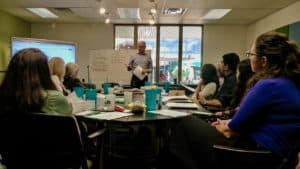Suppose you’re interested in teaching a team-based undergraduate research course. You might be wondering how to structure the class experience so that students learn how to collaborate productively by harnessing the diverse perspectives of a research team without succumbing to groupthink. One answer might be to use a small-group discussion process, such as the Interactivity Foundation (IF) uses, a process that intention ally focuses on having the group explore diverse perspectives and develop alternative ways to approach the research topic. This is the possibility we explored in a workshop for the Faculty Fellows Undergraduate Research at the University of Alabama at Birmingham (UAB) on September 14. The workshop was convened by Gareth Jones, the Assistant Director of UAB’s Office of Service Learning and Undergraduate Research.
ally focuses on having the group explore diverse perspectives and develop alternative ways to approach the research topic. This is the possibility we explored in a workshop for the Faculty Fellows Undergraduate Research at the University of Alabama at Birmingham (UAB) on September 14. The workshop was convened by Gareth Jones, the Assistant Director of UAB’s Office of Service Learning and Undergraduate Research.
The IF discussion process has been adapted to instructional settings at a number of colleges and universities by integrating student-facilitated discussion teams to develop alternative ways to frame and approach course content. Students learn how to facilitate a productive team as they rotate through sessions as the facilitator—and they learn now to be productive discussion participants. Since the process is intentionally “divergence-seeking,” it can help students productively explore dissenting points of view and avoid the tendency of prematurely shutting down contrasting perspectives. Those contrasting perspectives could very well hold the key to unlocking a complex topic. Effective research teams benefit from consideration of alternative ways of framing research questions and hypotheses. They rely on developing independent thinking and alternative perspectives within the team. All of these are core features of the IF process.
The workshop kicked off with a direct demonstration of the discussion process to introduce these themes. IF Vice President Jeff Prudhomme facilitated an exploratory discussion with the Faculty Fellows to uncover some of the different aspects of positive team-based research experiences and the diverse skills that are requisite for such experiences. The UAB Faculty Fellows spanned a range of fields, including art, neuro-psychology, education, foreign language, microbiology, and nursing.
Matt Martin, Dean of Faculty at Wesleyan College, followed up by recounting Wesleyan’s ongoing collaboration with IF. He provided an overview of how the use of student-facilitated discussion groups has grown from the curricular roots in Wesleyan’s innovative first-year seminar, WISe 101, where first-year students learn to facilitate their own discussion teams on “IF Fridays,” to the co-curricular program of student-facilitated IF Diversity and Inclusion Discussions. He described how the spirit of open, inclusive, and creative discussions has permeated the culture of the school.
Holly Boettger-Tong, Professor of Biology at Wesleyan, capped off the workshop by sharing a snapshot of how she uses the discussion process in her research courses in biology. This practical guidance offered a concrete way to envision how the process could be used by the Faculty Fellows. Boettger-Tong, Martin, and Prudhomme will work with any of the Faculty Fellows who decide they would like to integrate IF’s discussion process into a new team-based undergraduate research course.



